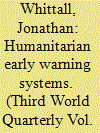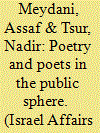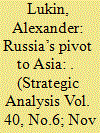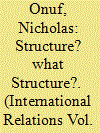|
|
|
Sort Order |
|
|
|
Items / Page
|
|
|
|
|
|
|
| Srl | Item |
| 1 |
ID:
101765


|
|
|
|
|
| Publication |
2010.
|
| Summary/Abstract |
The field of humanitarian early warning has emerged as a way to alert governments about countries facing imminent humanitarian crises, based on indicators of potential conflict, food shortages and other related issues. Early warning as a technical field has often failed because intervention in another state is based on national self-interests and the constraints of sovereignty. Governments continue to be unresponsive to areas outside of these considerations. Because this reality is overlooked, all the literature reviewed focuses on the technical fixes required to address the well known failures in early warning. As such, humanitarian early warning is frequently inconsequential at best, and at worst it has become instrumentalised by states to justify their interventions in countries based on their national self-interest, which is increasingly linked to national security in the era of the so-called 'global war on terror'.
|
|
|
|
|
|
|
|
|
|
|
|
|
|
|
|
| 2 |
ID:
131854


|
|
|
|
|
| Publication |
2014.
|
| Summary/Abstract |
Political poetry is not tested by its impact and the number of its readers but in its very participation in the public discourse on the issues of the day. Poetry moves between forces that focus the attention of its audience inwards, to the lyrics of the poems, and the forces that connect to the social, cultural, and political climate in which the poems are published. These movements reflect the power of poetry, which, using language, breaks the barriers that exist between people - individuals or groups, as well as between these individuals or groups and reality. This way, the poet serves as the element that formulates the informal cultural feelings in society and offers an interpretive package of the existing reality, as well as the alternative reality. Poets place their 'truth' within the perception of reality, and this truth can compete in the public arena with the 'truth' that is portrayed by politicians.
|
|
|
|
|
|
|
|
|
|
|
|
|
|
|
|
| 3 |
ID:
148723


|
|
|
|
|
| Summary/Abstract |
The article discusses the changes in Russia’s policy towards Asia, arguing that Russia’s pivot to Asia is a reality, one that is motivated by both political and economic interests. And although that shift is not progressing as quickly as some might want and occasionally encounters difficulties, the process has definitely begun and is in all likelihood irreversible. Only a small, marginal segment of Russian society continues to dream of unity with Europe—which itself has entered a period of severe crisis. Most of the Russian elite as well as the majority of Russian citizens understand that nobody is waiting for them with open arms. Therefore, not wanting a confrontation and in an effort to maintain working relations, Russia—under any leader—is unlikely to seek a relationship based on a common outlook. That will move Russia ever closer to the non-Western world, primarily the Asian giants.
|
|
|
|
|
|
|
|
|
|
|
|
|
|
|
|
| 4 |
ID:
090143


|
|
|
|
|
| Publication |
2009.
|
| Summary/Abstract |
Kenneth Waltz is a structural theorist. While scholars often comment on Waltz's conception of structure, they rarely address the philosophical assumptions behind it - assumptions that go back to Kant and finally to Aristotle. Appropriately situated, Waltz's conception of structure points to a strong version of constructivist social theory. To make my case, I trace Waltz's view of political structure in his early work, recapitulate his views on science, models and theory, address the question of his (or any) theory's relation to `reality', illustrate his difficulty with structural theory and institutional reality, and consider the vexed question of any theory's fit to a world already talked into existence. I show how close Waltz is to a philosophical position that solves his problem with theory's relation to reality and specifies the conditions under which any social theory can make sense or use of the term structure.
|
|
|
|
|
|
|
|
|
|
|
|
|
|
|
|
|
|
|
|
|